- Home
- Tahereh Mafi
Restore Me Page 2
Restore Me Read online
Page 2
It’s Juliette who finally breaks the silence.
“Are you upset with me?” she whispers. “For shooting him?”
My body stills.
Her eyes widen.
“No—no.” I say the words too quickly, but I mean them. “No, of course not. It’s not that.”
Juliette sighs.
“I’m not sure you’re aware of this,” she says finally, “but it’s okay to mourn the loss of your father, even if he was a terrible person. You know?” She peers up at me. “You’re not a robot.”
I swallow back the lump growing in my throat and gently extricate myself from her arms. I kiss her on the cheek and linger there, against her skin, for only a second. “I need to take a shower.”
She looks heartbroken and confused, but I don’t know what else to do. It’s not that I don’t love her company, it’s just that right now I’m desperate for solitude and I don’t know how else to find it.
So I shower. I take baths. I go for long walks.
I tend to do this a lot.
When I finally come to bed she’s already asleep.
I want to reach for her, to pull her soft, warm body against my own, but I feel paralyzed. This horrible half-grief has made me feel complicit in darkness. I worry that my sadness will be interpreted as an endorsement of his choices—of his very existence—and in this matter I don’t want to be misunderstood, so I cannot admit that I grieve him, that I care at all for the loss of this monstrous man who raised me. And in the absence of healthy action I remain frozen, a sentient stone in the wake of my father’s death.
Are you upset with me? For shooting him?
I hated him.
I hated him with a violent intensity I’ve never since experienced. But the fire of true hatred, I realize, cannot exist without the oxygen of affection. I would not hurt so much, or hate so much, if I did not care.
And it is this, my unrequited affection for my father, that has always been my greatest weakness. So I lie here, marinating in a sorrow I can never speak of, while regret consumes my heart.
I am an orphan.
“Aaron?” she whispers, and I’m pulled back to the present.
“Yes, love?”
She moves in a sleepy, sideways motion, and nudges my arm with her head. I can’t help but smile as I open up to make room for her against me. She fills the void quickly, pressing her face into my neck as she wraps an arm around my waist. My eyes close as if in prayer. My heart restarts.
“I miss you,” she says. It’s a whisper I almost don’t catch.
“I’m right here,” I say, gently touching her cheek. “I’m right here, love.”
But she shakes her head. Even as I pull her closer, even as she falls back asleep, she shakes her head.
And I wonder if she’s not wrong.
Juliette
I’m having breakfast by myself this morning—alone, but not lonely.
The breakfast room is full of familiar faces, all of us catching up on something: sleep; work; half-finished conversations. Energy levels in here are always dependent on the amount of caffeine we’ve had, and right now, things are still pretty quiet.
Brendan, who’s been nursing the same cup of coffee all morning, catches my eye and waves. I wave back. He’s the only one among us who doesn’t actually need caffeine; his gift for creating electricity also works as a backup generator for his whole body. He’s exuberance, personified. In fact, his stark-white hair and ice-blue eyes seem to emanate their own kind of energy, even from across the room. I’m starting to think Brendan keeps up appearances with the coffee cup mostly out of solidarity with Winston, who can’t seem to survive without it. The two of them are inseparable these days—even if Winston occasionally resents Brendan’s natural buoyancy.
They’ve been through a lot together. We all have.
Brendan and Winston are sitting with Alia, who’s got her sketchbook open beside her, no doubt designing something new and amazing to help us in battle. I’m too tired to move, otherwise I’d get up to join their group; instead, I drop my chin in one hand and study the faces of my friends, feeling grateful. But the scars on Brendan’s and Winston’s faces take me back to a time I’d rather not remember—back to a time when we thought we’d lost them. When we’d lost two others. And suddenly my thoughts are too heavy for breakfast. So I look away. Drum my fingers against the table.
I’m supposed to be meeting Kenji for breakfast—it’s how we begin our workdays—which is the only reason I haven’t grabbed my own plate of food. Unfortunately, his lateness is beginning to make my stomach grumble. Everyone in the room is cutting into fresh stacks of fluffy pancakes, and they look delicious. All of it is tempting: the mini pitchers of maple syrup; the steaming heaps of breakfast potatoes; the little bowls of freshly cut fruit. If nothing else, killing Anderson and taking over Sector 45 got us much better breakfast options. But I think we might be the only ones who appreciate the upgrades.
Warner never has breakfast with the rest of us. He pretty much never stops working, not even to eat. Breakfast is another meeting for him, and he takes it with Delalieu, just the two of them, and even then I’m not sure he actually eats anything. Warner never appears to take pleasure in food. For him, food is fuel—necessary and, most of the time, annoying—in that his body requires it to function. Once, while he was deeply immersed in some important paperwork at dinner, I put a cookie on a plate in front of him just to see what would happen. He glanced up at me, glanced back at his work, whispered a quiet thank you, and ate the cookie with a knife and fork. He didn’t even seem to enjoy it. This, needless to say, makes him the polar opposite of Kenji, who loves to eat everything, all the time, and who later told me that watching Warner eat a cookie made him want to cry.
Speaking of Kenji, him flaking on me this morning is more than a little weird, and I’m beginning to worry. I’m just about to glance at the clock for the third time when, suddenly, Adam is standing next to my table, looking uncomfortable.
“Hi,” I say, just a little too loudly. “What’s, uh, what’s up?”
Adam and I have interacted a couple of times in the last two weeks, but it’s always been by accident. Suffice it to say that it’s unusual for Adam to be standing in front of me on purpose, and I’m so surprised that for a moment I almost miss the obvious:
He looks bad.
Rough. Ragged. More than a little exhausted. In fact, if I didn’t know any better, I would’ve sworn Adam had been crying. Not over our failed relationship, I hope.
Still, old instinct gnaws at me, tugs at ancient heartstrings.
We speak at the same time:
“You okay . . . ?” I ask.
“Castle wants to talk to you,” he says.
“Castle sent you to come get me?” I say, feelings forgotten.
Adam shrugs. “I was walking past his room at the right time, I guess.”
“Um. Okay.” I try to smile. Castle is always trying to make nice between me and Adam; he doesn’t like the tension. “Did he say he wants to see me right now?”
“Yep.” Adam shoves his hands in his pockets. “Right away.”
“All right,” I say, and the whole thing feels awkward. Adam just stands there as I gather my things, and I want to tell him to go away, to stop staring at me, that this is weird, that we broke up forever ago and it was weird, you made it so weird, but then I realize he isn’t staring at me. He’s looking at the floor like he’s stuck, lost in his head somewhere.
“Hey—are you okay?” I say again, this time gently.
Adam looks up, startled. “What?” he says. “What, oh—yeah, I’m fine. Hey do you know, uh”—he clears his throat, looks around—“do you, uh—”
“Do I what?”
Adam rocks on his heels, eyes darting around the room. “Warner is never here for breakfast, huh?”
My eyebrows shoot up my forehead. “You’re looking for Warner?”
“What? No. I’m just, uh, wondering. He’s never here. You know? It
’s weird.”
I stare at him.
He says nothing.
“It’s not that weird,” I say slowly, studying Adam’s face. “Warner doesn’t have time for breakfast with us. He’s always working.”
“Oh,” Adam says, and the word seems to deflate him. “That’s too bad.”
“Is it?” I frown.
But Adam doesn’t seem to hear me. He calls for James, who’s putting away his breakfast tray, and the two of them meet in the middle of the room and then disappear.
I have no idea what they do all day. I’ve never asked.
The mystery of Kenji’s absence at breakfast is solved the moment I walk up to Castle’s door: the two of them are here, heads together.
I knock on the open door as a courtesy. “Hey,” I say. “You wanted to see me?”
“Yes, yes, Ms. Ferrars,” Castle says eagerly. He gets to his feet and waves me inside. “Please, have a seat. And if you would”—he gestures behind me—“close the door.”
I’m nervous in an instant.
I take a tentative step into Castle’s makeshift office and glance at Kenji, whose blank face does nothing to allay my fears. “What’s going on?” I say. And then, only to Kenji: “Why weren’t you at breakfast?”
Castle motions for me to take a seat.
I do.
“Ms. Ferrars,” he says urgently. “You have news of Oceania?”
“Excuse me?”
“The RSVP. You received your first RSVP, did you not?”
“Yeah, I did,” I say slowly. “But no one is supposed to know about that yet—I was going to tell Kenji about it over breakfast this morning—”
“Nonsense.” Castle cuts me off. “Everyone knows. Mr. Warner knows, certainly. And Lieutenant Delalieu knows.”
“What?” I glance at Kenji, who shrugs. “How is that possible?”
“Don’t be so easily shocked, Ms. Ferrars. Obviously all of your correspondence is monitored.”
My eyes widen. “What?”
Castle makes a frustrated motion with his hand. “Time is of the essence, so if you would, I’d really—”
“Time is of what essence?” I say, irritated. “How am I supposed to help you when I don’t even know what you’re talking about?”
Castle pinches the bridge of his nose. “Kenji,” he says suddenly. “Will you leave us, please?”
“Yep.” Kenji jumps to his feet with a mock salute. He heads toward the door.
“Wait,” I say, grabbing his arm. “What’s going on?”
“I have no idea, kid.” Kenji laughs, shakes his arm free. “This conversation doesn’t concern me. Castle called me in here earlier to talk about cows.”
“Cows?”
“Yeah, you know.” He arches an eyebrow. “Livestock. He’s been having me do reconnaissance on several hundreds of acres of farmland that The Reestablishment has been keeping off the radar. Lots and lots of cows.”
“Exciting.”
“It is, actually.” His eyes light up. “The methane makes it all pretty easy to track. Makes you wonder why they wouldn’t do something to preve—”
“Methane?” I say, confused. “Isn’t that a kind of gas?”
“I take it you don’t know much about cow shit.”
I ignore that. Instead, I say, “So that’s why you weren’t at breakfast this morning? Because you were looking at cow poop?”
“Basically.”
“Well,” I say. “At least that explains the smell.”
It takes Kenji a second to catch on, but when he does, he narrows his eyes. Taps me on the forehead with one finger. “You’re going straight to hell, you know that?”
I smile, big. “See you later? I still want to go on our morning walk.”
He makes a noncommittal grunt.
“C’mon,” I say, “it’ll be fun this time, I promise.”
“Oh yeah, big fun.” Kenji rolls his eyes as he turns away, and shoots Castle another two-finger salute. “See you later, sir.”
Castle nods his good-bye, a bright smile on his face.
It takes a minute for Kenji to finally walk out the door and shut it behind him, but in that minute Castle’s face transforms. His easy smile, his eager eyes: gone. Now that he and I are fully alone, Castle looks a little shaken, a little more serious. Maybe even . . . scared?
And he gets right down to business.
“When the RSVP came through, what did it say? Was there anything memorable about the note?”
“No.” I frown. “I don’t know. If all my correspondence is being monitored, wouldn’t you already know the answer to this question?”
“Of course not. I’m not the one monitoring your mail.”
“So who’s monitoring my mail? Warner?”
Castle only looks at me. “Ms. Ferrars, there is something deeply unusual about this response.” He hesitates. “Especially as it’s your first, and thus far, only RSVP.”
“Okay,” I say, confused. “What’s unusual about it?”
Castle looks into his hands. At the wall. “How much do you know about Oceania?”
“Very little.”
“How little?”
I shrug. “I can point it out on a map.”
“And you’ve never been there?”
“Are you serious?” I shoot him an incredulous look. “Of course not. I’ve never been anywhere, remember? My parents pulled me out of school. Passed me through the system. Eventually threw me in an insane asylum.”
Castle takes a deep breath. Closes his eyes as he says, very carefully, “Was there anything at all memorable about the note you received from the supreme commander of Oceania?”
“No,” I say. “Not really.”
“Not really?”
“I guess it was little informal? But I don’t thi—”
“Informal, how?”
I look away, remembering. “The message was really brief,” I explain. “It said Can’t wait to see you, with no sign-off or anything.”
“‘Can’t wait to see you’?” Castle looks suddenly puzzled.
I nod.
“Not can’t wait to meet you,” he says, “but can’t wait to see you.”
I nod again. “Like I said, a little informal. But it was polite, at least. Which I think is a pretty positive sign, all things considered.”
Castle sighs heavily as he turns in his chair. He’s facing the wall now, his fingers steepled under his chin. I’m studying the sharp angles of his profile as he says quietly,
“Ms. Ferrars, how much has Mr. Warner told you about The Reestablishment?”
Warner
I’m sitting alone in the conference room, running an absent hand over my new haircut, when Delalieu arrives. He’s pulling a small coffee cart in behind him, wearing the tepid, shaky smile I’ve come to rely upon. Our workdays have been busier than ever lately; thankfully, we’ve never made time to discuss the uncomfortable details of recent events, and I doubt we ever will.
For this I am forever grateful.
It’s a safe space for me here, with Delalieu, where I can pretend that things in my life have changed very little.
I am still chief commander and regent to the soldiers of Sector 45; it’s still my duty to organize and lead those who will help us stand against the rest of The Reestablishment. And with that role comes responsibility. We’ve had a lot of restructuring to do while we coordinate our next moves, and Delalieu has been critical to these efforts.
“Good morning, sir.”
I nod a greeting as he pours us both a cup of coffee. A lieutenant such as himself need not pour his own coffee in the morning, but we’ve come to prefer the privacy.
I take a sip of the black liquid—I’ve recently learned to enjoy its bitter tang—and lean back in my chair. “Updates?”
Delalieu clears his throat.
“Yes, sir,” he says, hastily returning his coffee cup to its saucer, spilling a little as he does. “Quite a few this morning, sir.”
I tilt my
head at him.
“Construction of the new command station is going well. We’re expecting to be done with all the details in the next two weeks, but the private rooms will be move-in ready by tomorrow.”
“Good.” Our new team, under Juliette’s supervision, comprises many people now, with many departments to manage and, with the exception of Castle, who’s carved out a small office for himself upstairs, thus far they’ve all been using my personal training facilities as their central headquarters. And though this had seemed like a practical idea at its inception, my training facilities are accessible only through my personal quarters; and now that the group of them are living freely on base, they’re often barging in and out of my rooms, unannounced.
Needless to say, it’s driving me insane.
“What else?”
Delalieu checks his list and says, “We’ve finally managed to secure your father’s files, sir. It’s taken all this time to locate and retrieve the bulk of it, but I’ve left the boxes in your room, sir, for you to open at your leisure. I thought”—he clears his throat—“I thought you might like to look through his remaining personal effects before they are inherited by our new supreme commander.”
A heavy, cold dread fills my body.
“There’s quite a lot of it, I’m afraid,” Delalieu is still saying. “All his daily logs. Every report he’d ever filed. We even managed to locate a few of his personal journals.” Delalieu hesitates. And then, in a tone only I know how to decipher: “I do hope his notes will be useful to you, somehow.”
I look up, meet Delalieu’s eyes. There’s concern there. Worry.
“Thank you,” I say quietly. “I’d nearly forgotten.”
An uncomfortable silence settles between us and, for a moment, neither of us knows exactly what to say. We still haven’t discussed this, the death of my father. The death of Delalieu’s son-in-law. The horrible husband of his late daughter, my mother. We never talk about the fact that Delalieu is my grandfather. That he is the only kind of father I have left in the world.
It’s not what we do.
So it’s with a halting, unnatural voice that Delalieu attempts to pick up the thread of conversation.

 Shatter Me
Shatter Me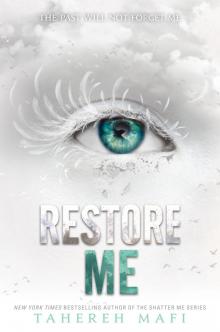 Restore Me
Restore Me Destroy Me
Destroy Me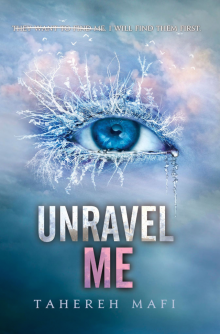 Unravel Me
Unravel Me Ignite Me
Ignite Me Defy Me
Defy Me Fracture Me
Fracture Me Shadow Me
Shadow Me Whichwood
Whichwood Reveal Me
Reveal Me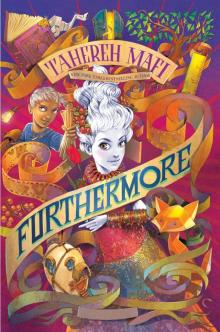 Furthermore
Furthermore Shadow Me (Shatter Me Novella)
Shadow Me (Shatter Me Novella) Believe Me
Believe Me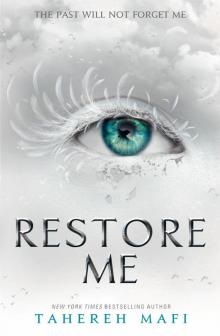 Restore Me (Shatter Me)
Restore Me (Shatter Me)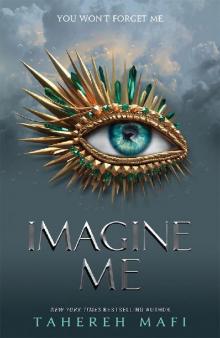 Imagine Me
Imagine Me An Emotion of Great Delight
An Emotion of Great Delight Find Me
Find Me A Very Large Expanse of Sea
A Very Large Expanse of Sea Unravel Me: The Juliette Chronicles Book 2
Unravel Me: The Juliette Chronicles Book 2